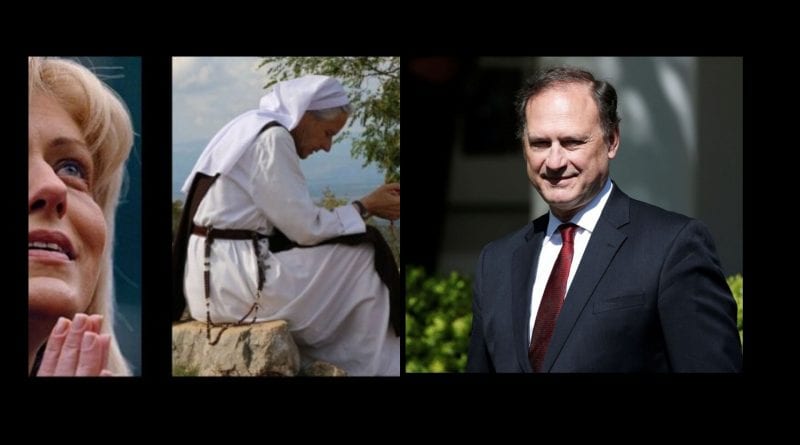Skip to content

Briefs filed by a wide range of religious groups—Christian, Jewish, and Muslim—express deep concern that the position now adopted by the Court “will trigger open conflict with faith based employment practices of numerous churches, synagogues, mosques, and other religious institutions.” They argue that “[r]eligious organizations need employees who actually live the faith,” and that compelling a religious organization to employ individuals whose conduct flouts the tenets of the organization’s faith forces the group to communicate an objectionable message.
This problem is perhaps most acute when it comes to the employment of teachers. A school’s standards for its faculty “communicate a particular way of life to its students,” and a “violation by the faculty of those precepts” may undermine the school’s “moral teaching.” Thus, if a religious school teaches that sex outside marriage and sex reassignment procedures are immoral, the message may be lost if the school employs a teacher who is in a same-sex relationship or has undergone or is undergoing sex reassignment. Yet today’s decision may lead to Title VII claims by such teachers and applicants for employment.
At least some teachers and applicants for teaching positions may be blocked from recovering on such claims by the “ministerial exception” recognized in Hosanna-Tabor Evangelical Lutheran Church and School v. EEOC, 565 U. S. 171 (2012). Two cases now pending before the Court present the question whether teachers who provide religious instruction can be considered to be “ministers.” But even if teachers with those responsibilities qualify, what about other very visible school employees who may not qualify for the ministerial exception? Provisions of Title VII provide exemptions for certain religious organizations and schools “with respect to the employment of individuals of a particular religion to perform work connected with the carrying on” of the “activities” of the organization or school, 42 U. S. C. §2000e–1(a); see also §2000e–2(e)(2), but the scope of these provisions is disputed, and as interpreted by some lower courts, they provide only narrow protection.
Healthcare. Healthcare benefits may emerge as an intense battleground under the Court’s holding. Transgender employees have brought suit under Title VII to challenge employer-provided health insurance plans that do not cover costly sex reassignment surgery Similar claims have been brought under the Affordable Care Act (ACA), which broadly prohibits sex discrimination in the provision of healthcare.
Such claims present difficult religious liberty issues because some employers and healthcare providers have strong religious objections to sex reassignment procedures, and therefore requiring them to pay for or to perform these procedures will have a severe impact on their ability to honor their deeply held religious beliefs.
Justice Gorsuch writes today in his majority opinion that how “doctrines protecting religious liberty interact with Title VII [of the 1964 Civil Rights Act] are questions for future cases.”
Separately, the employers fear that complying with Title VII’s requirement in cases like ours may require some employers to violate their religious convictions. We are also deeply concerned with preserving the promise of the free exercise of religion enshrined in our Constitution; that guarantee lies at the heart of our pluralistic society. But worries about how Title VII may intersect with religious liberties are nothing new; they even predate the statute’s passage. As a result of its deliberations in adopting the law, Congress included an express statutory exception for religious organizations. §2000e–1(a). This Court has also recognized that the First Amendment can bar the application of employment discrimination laws “to claims concerning the employment relationship between a religious institution and its ministers.” Hosanna-Tabor Evangelical Lutheran Church and School v. EEOC, 565 U. S. 171, 188 (2012). And Congress has gone a step further yet in the Religious Freedom Restoration Act of 1993 (RFRA), 107 Stat. 1488, codified at 42 U. S. C. §2000bb et seq. That statute prohibits the federal government from substantially burdening a person’s exercise of religion unless it demonstrates that doing so both furthers a compelling governmental interest and represents the least restrictive means of furthering that interest. §2000bb–1. Because RFRA operates as a kind of super statute, displacing the normal operation of other federal laws, it might supersede Title VII’s commands in appropriate cases. See §2000bb–3.
But how these doctrines protecting religious liberty interact with Title VII are questions for future cases too. Harris Funeral Homes did unsuccessfully pursue a RFRA-based defense in the proceedings below. In its certiorari petition, however, the company declined to seek review of that adverse decision, and no other religious liberty claim is now before us. So while other employers in other cases may raise free exercise arguments that merit careful consideration, none of the employers before us today represent in this Court that compliance with Title VII will infringe their own religious liberties in any way.
Like this:
Like Loading...





